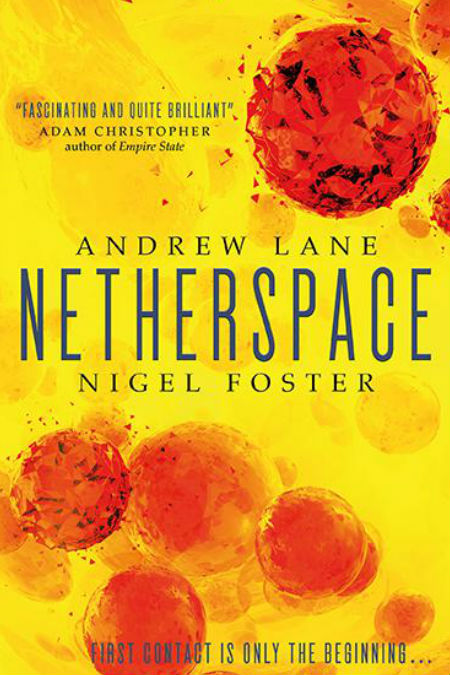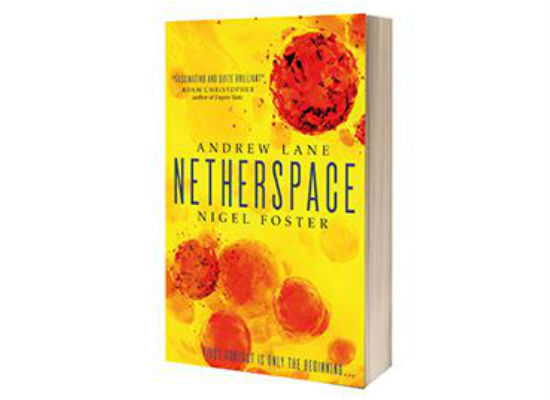
Among humanity’s many contradictory traits, one that stands out is our ability to romanticise just about anything.
Whether it’s things as mundane as upcoming holidays or an album release by our favourite artist, or idealistic hopes for a better future, one that dwarfs our oft-blighted present, we are ever-ready to slap on the rose-coloured glasses and stare dreamily at all kinds of imagined possibilities.
Sometimes this plays out as expected, but as Netherspace, the collaborative novel by Andrew Lane and Nigel Foster makes painfully clear, often it does not with the future, especially the gee-whiz techno-wonders that have been promised since time immemorial (where are the flying cars exactly?), often resembling a dented and bashed-in version of what we breathlessly anticipated would come to pass.
In the near-future Earth in which Netherspace takes place, aliens have arrived – the technologically-advanced Gliese, the human artifact-acquisitive Cancri and the art-loving Eridani – and as you might expect, totally reshaped human society.
But while humanity has been gifted with side-slip generators, which allow it to travel fantastically fast through our solar system and the galaxy beyond, leading to the establishment of colonies without number, it has come at a great cost.
“Marc felt an increasing anger, aware that it covered a pit of unease that only deepened the more he discovered about space flight and hyperspace and the odds of getting where they wanted to go unscathed. He’d always known space flight was like launching a ship into rough seas and hoping for the best, the metaphor, for him, has meant seventeenth- and eighteenth-century tea clippers: all sails and masts and spars and jolly heave-ho Jack Tars. Now he was beginning to realise they were more like Vikings in open longboats sailing the North Atlantic. Or islanders from a small, insignificant atoll sending canoes across the Pacific Ocean. This wasn’t exploration but an act of faith … or desperation.” (PP. 162-163)
Far from Roddenberry’s Star Trek vision of a united future Earth, cosily-ensconsed in a Federation of like-minded aliens, the planet is now a patchwork of city states, connected by AIs, with many people living in the Out There, the so-called regions outside the realm of urban control.
While humanity has undoubtedly take a great big warp-powered leap into a glittering future, it remains totally subservient to the wanton needs and capricious actions of the three alien races, all of whom seem inordinately fond of acquiring actual human beings above all else.
Hence, every generator or piece of high-tech wizardry comes with a fairly hefty price tag of x number of human lives, and those charged with overseeing these exchanges, principally Earth central’s Galactic Division, based in Berlin (where aliens first arrived), know all too well the Faustian social and political ill-effects of humanity’s great leap forward.
What is most perplexing in this brave new world, where netherspace (the mysterious corridors below or above normal space) is traversed as easily as we cross the street to buy bread and milk – though again at great cost in human lives – is that we still can’t communicate with the aliens, who remain as obstinately unknowable as they did 40 years ago when they first arrived.

It’s not an ideal world but then neither is it terrible either (beats an alien invasion right?); it is, however, not the romanticised vision of the future many of us cling to, something that is remarked upon again and again by characters in the book, principally its leads, state-sanctioned assassin Kara and avant garde artist Marc.
Layered across all this alien-triggered existential angst is a lo-fi action thriller about rescuing a group of Pilgrims off to establish an utopian new world where humanity and alien live in perfect harmony.
Of course that goes the way of all well-intentioned but hopelessly naive plans with Kara, Marc, pre-cog Tse (he can see parts of a possible future but not all of it) and the crew of the very unromantically-named RIL-FIJ-DOQ sent to rescue the Pilgrims from themselves and their Cancri-kidnappers, in the process discovering that humanity is so far away from the idealised visions of the future that it shouldn’t have bothered conjuring them in the first place.
Netherspace is brilliantly, realistically, imaginatively expansive, presenting us at every turn with a world in which nothing is ideal but nor is it dystopian, and where the idea of first contact has exactly gone according to the much-imagined playbook.
“Marc said no, it was more than in deep space and especially netherspace nothing surprised or shocked. Just getting there was startling enough. Their minds had accepted that anything could happen and probably would. But maybe it was safer to assume that Nikki and Henk – and probably Tate – were no longer quite human. Whatever netherspace was, it has corrupted them.” (P. 277)
The gulf between the glossiness of a Star Trek-ian future of sleek spaceships and peace, love & galactic harmony, and the gritty realism of the reality is deeply compelling, shining a realism on sunny side-up sci-fi that recasts humanity’s nascent journeys into the great cosmic beyond to something much more akin to what might actually happen.
But while the reality of humanity’s galactic endeavours may verge on the banal and utilitarian, the galaxy itself is richly, impossibly alien, with the many other lifeforms out there diametrically opposed to human understanding in a multiplicity of ways.
Avoiding the great trap of anthropomorphising the aliens, who are always regarded as damn near impossibly unknowable, Lane and Foster have gifted us with a universe which is truly and utterly beyond anything we could happen, and ripe with myriad mysteries and possibilities.
Which is just as well since a sequel is in the offing – Originators arrives May 2018 – one in which, no doubt, we will be plunged even further, and with great reward given the extensive delights of Netherspace’s unparalleled willingness to upset the idealistic sci-fi applecart, into a galaxy so dark and unknowable that you would be best leaving the rose-coloured glasses at home, and taking your chances as you hang on for dear life through the full-on ride that is this wild and dimly-understood near-future of ours.